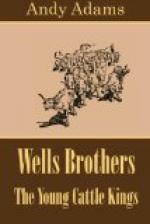“Then wish the boys who brave the storm success,” urged the old factor.
“I do,” snorted the grizzled ranchman. “These beeves are a story that is told. I’m here to sell young Wells another herd of cattle. He’s my customer as much as yours. That’s the reason I urged his presence to-day.”
The atmosphere cleared. On the market and under the weight, each beef was paying the cost of three the year before; but it was the letter of the bond, and each party to the contract respected his obligation.
After returning to the office, on a petty pretext, Mr. Stoddard and Joel wandered away. They returned early in the afternoon, to find all accounts made up, and ready for their personal approval. The second shipment easily enabled Joel to take up his contract, and when the canceled document was handed him, Mr. Stoddard turned to the senior member of the firm.
“I’ve offered to duplicate that contract,” said he, “on the same price and terms, and for double the number of cattle. This quarantine raises havoc with delivery.”
“A liberal interpretation of the new law is in effect,” remarked the senior member. “There’s too many interests involved to insist on a rigid enforcement. The ban is already raised on any Panhandle cattle, and any north of certain latitudes can get a clean bill of health. If that’s all that stands in the way of a trade, our firm will use its good offices.”
“In that case,” said Joel, nodding to Mr. Stoddard, “we’ll take your herd at Ogalalla. Move it down to the old trail crossing on the Republican, just over the state line and north of our range. This firm is perfectly acceptable again as middlemen or factors,” he concluded, turning to the member present.
“Thank you,” said the old factor. “We’ll try and merit any confidence reposed. This other matter will be taken up with the quarantine authorities at once. Show me your exact range,” he requested, turning to a map and indicating the shipping station.
Wells Brothers’ range lay in the northwest corner of the state. The Republican River, in Nebraska, ran well over the line to the north, with unknown neighbors on the west in Colorado.
“It’s a clear field,” observed the old factor. “Your own are the only cattle endangered, and since you are the applicant for the bill of health, you absolve the authorities from all concern. Hurry in your other shipments, and the railroad can use its influence—it’ll want cattle to ship next year. The ranges must be restocked.”
There was sound logic in the latter statement. A telegram was sent to Ogalalla, to start the through herd, and another to the beef outfit, to hurry forward the next shipment. Joel left for home that night, and the next evening met his outfit, ten miles out from the Beaver, with a perfect duplicate of the former consignment. It was early harvest on the cattle ranges, and those who were favored with marketable beef were eager to avoid the heavy rush of fall shipments.




